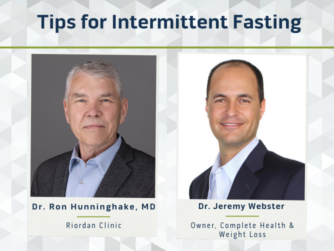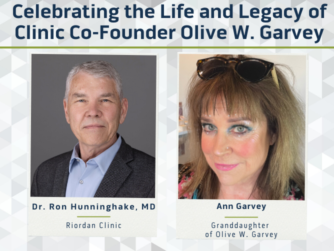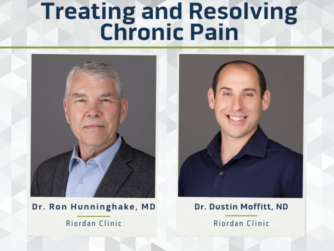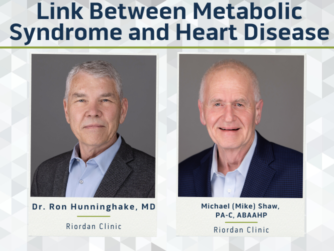In this episode of the Real Health Podcast, Chief Medical Officer Dr. Ron Hunninghake, MD, and Dr. Kirsten West, ND, LAc, FABNO, discuss how nutrition and food choices can play a role in preventing cancer or help in healing following a diagnosis.
https://www.youtube.com/watch?v=cseir-NXho4
Thanks to this Episode’s Sponsor
Links
Dr. Ron Hunninghake: https://riordanclinic.org/staff/ron-hunninghake-md/
Dr. Kirsten West, ND, LAc, FABNO: https://riordanclinic.org/staff/kirsten-west-nd-lac-fabno/
Riordan Clinic: https://riordanclinic.org/
Read the Transcript
Disclaimer: The information contained on the Real Health Podcast and the resources mentioned are for educational purposes only. They’re not intended as and shall not be understood or construed as medical or health advice. The information contained on this podcast is not a substitute for medical or health advice from a professional who is aware of the facts and circumstances of your individual situation. Information provided by hosts and guests on the Real Health Podcast or the use of any products or services mentioned does not create a practitioner-patient relationship between you and any persons affiliated with this podcast.
Intro: This is the Real Health Podcast brought to you by Riordan Clinic. Our mission is to bring you the latest information and top experts in functional and integrative medicine to help you make informed decisions on your path to real health.
Dr. Ron Hunninghake: Well, welcome, everyone. I’m Dr. Ron Hunninghake, and I’ll be hosting another episode of the Real Health Podcast, and I’m delighted today to have one of my favorite persons on, which is Dr. Kirsten West, who’s our naturopathic oncologist here at Riordan Clinic. And since this is nutrition month when we’re recording this, we wanted to talk a little bit about what I’m just going to call anti-cancer food choices. So this is hopefully relevant to people who are wanting to avoid getting cancer, but also very relevant to those of you who are dealing with cancer, or you have family members with cancer. This should be good information. So Kirsten, thank you very much for being on our program today.
Dr. Kirsten West: Absolutely. It’s a pleasure to be here as always.
Dr. Ron Hunninghake: Yeah. So a lot of people have heard this whole story about when you get cancer, you have to make these drastic changes and you have to become a vegetarian and you can’t have this and you can’t do that. Can we today give people, both people who have cancer, people who are wanting to avoid cancer, what are some of the basic principles really of healthy food eating that will help us reduce our risk for cancer and if we do have cancer, will help us get better outcomes in our therapy? So what would you think, when you think about what’s some of the most important things, what comes to your mind about food?
Dr. Kirsten West: I think getting back to our roots. I think that we’ve become a society of ease and comfort and quick fix. And so what’s happened is we’ve incorporated a bunch of processed foods in our dietary intake and in our lives. And so I think that it’s really important for us to get back to clean eating, vegetables, fruits, clean proteins. I think that what happens for several cancer patients is fear is very … As soon as you’re diagnosed with cancer, that is a loaded word. It comes with a lot of fear. You get on the internet, and you start diving in, and it seems like there’s one-size-fits-all diet once you have cancer. And there really isn’t. It’s very individualized, which is what we do as doctors, obviously, help to figure out what the best diet is for somebody or food intake.
I don’t even like the word diet, but I think it is important to realize that it’s not all about a vegan or a vegetarian diet or going keto or doing this or doing that. I mean, for some people it is, but figuring that out is key. I think, like I said, getting back to the basics, focusing on unprocessed foods. Mediterranean diet is always my first go-to until we know more.
Dr. Ron Hunninghake: I like to tell patients that look for color because colorful vegetables predominantly, and fruits, they are rich in phytonutrients, and we do know that these phytonutrients, diindolylmethane, for instance, they’re very high in cruciferous vegetables. This helps block estrogen receptors, things like that.
Dr. Kirsten West: Exactly.
Dr. Ron Hunninghake: It helps your liver detoxify, and you can go through this long list of the phytonutrients and all the good they do to help us stay healthy, and if we have cancer, to help us overcome the cancer. So just seeing two, three, four colors on your plate when you sit down to eat, that’s one really good thing.
Dr. Kirsten West: Yeah, the other thing I might add to that, very good point about the colors being as colorful as we can. I love the thought of just making a big salad with even fruits in that salad and lots of different colored vegetables and olive oil. My patients always hear me say that olive oil is one of the best things you can do. But I think the other thing that we need to remember is for the past 100 years in the American diet, we’ve thought of protein as the main star of the meal. Like the steak or the big piece of chicken or whatever, and what we really need to be doing is looking at the vegetables and the nuts and the seeds and the oil as the main stars of the meal and that protein being the sidecar.
Dr. Ron Hunninghake: Yeah. The other part about the vegetables is that we’re really, if you stop and think about it, one of the most important things we can do is take good care of the good bacteria in our guts. And they predominantly like vegetables and fiber, matter of fact, they live on fiber. And if we have good gut foods, then our immune system is going to be better. And a big part of avoiding cancer and treating cancer is optimizing the immune system. So these colorful high-fiber foods help take care of our gut flora.
Dr. Kirsten West: That’s so true. There’s actually a bacteria in our gut called bifidobacteria, and it makes the majority of our B12. So some of our B12 production is in our gut, and we want to keep those guys happy. And so some of the best things we can do, asparagus, leaks, those are two big foods that have so many prebiotics.
Dr. Ron Hunninghake: And the colors also are anti-inflammatory. And so keeping inflammation under control is a crucial part of staying healthy in general and certainly conquering cancer.
Dr. Kirsten West: Yeah.
Dr. Ron Hunninghake: So now, one of the things that I think we should deal with – a lot of people assume that when they get cancer they’re going to have to go vegetarian, but that’s not necessarily true.
Dr. Kirsten West: It’s not true. It’s not true. And I think you can get online the second … I mean a lot of the new patients that I see have gone completely vegetarian or vegan, have started juicing. And in fact, that really may not be the best thing because doing a completely vegetarian vegan diet and juicing may actually increase blood glucose. And we know that blood glucose is not the best thing with cancer. I mean, if it’s done correctly, you can manage or mitigate the blood glucose spikes. But I think the reason animal proteins have gotten such a bad rap is because of the way that we source them in this country now.
Dr. Ron Hunninghake: Yeah.
Dr. Kirsten West: Animal protein inherently isn’t bad, but the way that we raise our animals in this country is not the best.
Dr. Ron Hunninghake: You mean the cows are not raised on the farm anymore where-
Dr. Kirsten West: No.
Dr. Ron Hunninghake: … we give them names and take really good care of them and make sure they eat lots of green grass and stuff like that, that they don’t do that anymore?
Dr. Kirsten West: Yeah. Unfortunately not. And I just wrote an article for us about CAFOs, which are concentrated animal feeding operations, and there’s about thousands of animals kept in a small perimeter, and they’re on top of each other. And of course, those animals, not only are they unhappy, so we can talk about animal welfare, but they’re given antibiotics to stop disease, growth hormones to fatten them up, and all of that. I mean, that’s not the meat we should be eating.
Dr. Ron Hunninghake: Well, there’s that saying, you are what you eat, ate. And so what these large operations, the cows anyway, they consume a lot of soy and a lot of corn. And so right away, you’re getting into glyphosate issues, and soy and corn have the wrong polyunsaturates in them that are not so good for us. They are more inflammatory and cause weight gain and set people up for blood sugar problems and all kinds of things.
Dr. Kirsten West: It changes the whole fatty acid composition of the meat, causing increased inflammation. So they’ve done studies on that. So when you look at, and I want to make an important distinction here between grass-fed and grass-finished, a lot of people will go out and they think that, “Oh, well, okay, I’m not getting the mass farmed cows. I’m getting grass-fed cows.” But the thing is that a grass-fed cow can be fed grain for the majority of their life, only given grass for a little bit of it. So they’re grass-fed, and they’re like, “Well, I’m buying grass-fed meat.” Grass-finished is what you want. Grass-finished is a completely pasteurized animal. And they’ve done studies comparing the fatty acid composition in those animals compared to the animals that are fed grains, soy, corn. It’s a completely different ballgame. And they’re actually, those meats are healthy for us.
Dr. Ron Hunninghake: Yeah. So these animals, and we mentioned cows, but you could talk about pigs and chickens-
Dr. Kirsten West: Pigs.
Dr. Ron Hunninghake: Basically, they’re all in this kind of environment, which, unfortunately, when we eat their meat, it sets us up for the metabolic syndrome. The metabolic syndrome is where we are pre-diabetic, and then we become diabetic, and then we have increased inflammation, and then we put on extra weight ourselves, and then autoimmune diseases, and then down that road is, here comes cancer. Cancer is one of the big consequences of the metabolic syndrome, not just diabetes. Diabetes is a big one, but cancer is following right along in its footsteps.
Dr. Kirsten West: Yeah.
Dr. Ron Hunninghake: And so people have to think that their food choices they’re making today do have consequences-
Dr. Kirsten West: They do.
Dr. Ron Hunninghake: … down the road.
Dr. Kirsten West: They do. And a lot of people ask, “Well, they’re going to be doing these CAFOs, they’re going to be having these large operations. So how can I make a difference?” And the way that you make a difference is actively seeking better choices when you go to the grocery store because the more that the population consumers look for certain things, the more that practices are going to change.
Advertisment: There’s a lot more to this conversation, and it’s coming up right after a quick break. Today’s podcast is brought to you by LivOn Labs, makers of liposomal vitamins and supplements. LivOn uses a liposomal encapsulation technology to protect nutrients from destruction in the digestive system. This allows for more efficient delivery of essential vitamins and nutrients. Choose from various supplements that support health and wellbeing such as lypo-sphere vitamin C, magnesium, glutathione, and more. To learn more visit LivOn Labs, that’s L-I-V-O-Nlabs.com.
Dr. Ron Hunninghake: Yeah, our pocketbook is our most powerful way of modifying these trends and how people are eating. And none of this means that we have to restrict ourselves or deny ourselves. And frankly, since my wife and I, when the pandemic started, we decided to stop eating out so much at restaurants, not against restaurants, but a lot of times it’s the wrong oils or they don’t make any big distinction about the quality of the meats or whatever, but just cooking on our own at home, it was like we rediscovered the joy of cooking. We were able to make better choices. We enjoyed our food more and the company that we had with each other. So there was a lot of things that are anti-cancer about just taking more control of your own cooking choices and eating at home.
Dr. Kirsten West: Yes. It’s interesting. We have a French au pair currently and watching his practices around food is very different from America. He doesn’t really know what it is to go eat out. He said even if he would go out and be out with friends until 9:00 PM it wasn’t ever a thought, “Oh, I’m going to stop and get takeout.” It’s, “I’m going to go home and make the food that I have in my refrigerator and cook.” So it’s just America has a very different take on what … Again, it comes back to ease for us, what we think is easiest and quickest may not be the best for us health-wise.
Dr. Ron Hunninghake: That’s right. That’s right.
Dr. Kirsten West: Yeah.
Dr. Ron Hunninghake: So is there anything in your own personal dietary choices that you’ve adopted that fit into this anti-cancer mode of eating that we’re talking about?
Dr. Kirsten West: Yeah, I think a couple things. I think that the reason cancer may be so prevalent in the American society, and it’s becoming a worldwide issue, is that we really do tend to have our arachidonic versus omega-3 fatty acid skewed. In the dietary intake of most Americans, even if you are eating healthier, we tend to get too many omega sixes, and omega sixes are inflammatory. And the more that you have chronic low-grade inflammation from something that you eat every day, you’re setting yourself up for potential disease in the future. So one thing that we’ve really adopted is I pay attention a lot to the types of fats that we’re eating in our household. So olive oil, nuts, seeds, anchovies, not yet for my son, a 2 year old, maybe one day, anchovies. Wild-caught salmon, things like that. Really making a conscious choice and being conscious and aware of the type of fats that we are eating is a big one. And adding those to those veggies because the more fats that you add to veggies, the more you’re going to absorb those nutrients.
Dr. Ron Hunninghake: That’s right. Now, the timing of the meals too can be really important.
Dr. Kirsten West: I was just-
Dr. Ron Hunninghake: You were just going to get into that.
Dr. Kirsten West: … you and I are on the same wavelength. I was just going to say that the timing of the meals is very important, too. Our society has progressed almost too fast for our physiological makeup. And our bodies are used to having periods of time away from food, and we just don’t have it that much anymore because we have the ease of getting a snack whenever we want it. So I think that we need to start instilling, and more and more data is coming out showing that intermittent fasting or more time away from meals is actually very beneficial for our health in so many ways. Something as simple as getting 13 hours a night, making sure that you have 13 hours a day away from food, that’s not much. So 13 hours at night after you finish dinner. But that key to that 13 hours is having that three hours between finishing dinner and going to bed. You want to give your body-
Dr. Ron Hunninghake: That’s huge because your quality of sleep has a big role to play in your overall health, your sense of wellbeing, your energy the next day. But it also is an anti-cancer kind of behavior.
Dr. Kirsten West: Absolutely. Absolutely.
Dr. Ron Hunninghake: Because you can more easily develop that metabolic flexibility if you’re going for at least 12 to 15 hours between meals. And if you’re snacking right up to bedtime, a lot of your blood is going to be going to your gut to try to digest that, and you’re not having so much for the detoxification that you need to do during the night.
Dr. Kirsten West: Right, or autophagy, which is getting rid of those cells that need to be gotten rid of. So that’s another aspect of fasting that is so beautiful. It gives the body time to heal and repair and do all the cleanup it needs to do. The other key to that fasting is, I think we forget about what breakfast means. Breakfast means breaking your fast. So one of the keys to breakfast is making sure that you’re not starting with cereal or starting with, which is a processed food, which we again need to get away from, but focusing on more of a protein fat meal for breakfast so that our blood sugar is not fluctuating the first time we put something in our mouth on waking.
Dr. Ron Hunninghake: Just the mere fact that we eat together more and have really good conversation and develop our relationships because we know that broken relationships and stress, that is a promotion of cancer and other chronic illnesses as well. And so people are so used to eating on the run now and or bringing in outside meals, and it’s all very fractured and fragmented. And so if we can get that kind of cohesiveness within our relationships and our families, that can actually help our immune system.
Dr. Kirsten West: Absolutely. The food should be communal. That’s how it was meant to be. So it’s therapeutic in so many ways.
Dr. Ron Hunninghake: And once again, back to our whole metabolic approach to cancer, which you have done lots of training in, you and I both have. We have to take care of all of these different terrains within our body and try to turn it into a symphony.
Dr. Kirsten West: Right.
Dr. Ron Hunninghake: And I think when people are working at this and flowing with food and timing and all the various things we’ve just discussed, I feel like they have a greater sense of inner harmony and that’s going to help them develop better immune function, just that alone.
Dr. Kirsten West: Yeah, and it’s interesting. When you look at the Terrain 10 – food, you could see how food could impact every single one of those.
Dr. Ron Hunninghake: Right. Right.
Dr. Kirsten West: So it’s big, it’s foundational for us.
Dr. Ron Hunninghake: Food should be a time to de-stress, detoxify, re-nourish, instill a sense of cohesiveness in relationships because a lot of the stress that we have is PTSD, post-traumatic. But if you can have that togetherness with people and build a really healthy meal together, that has a tremendous healing effect upon the relationships as well.
Dr. Kirsten West: Absolutely. Absolutely. And those relationships are so important. And PTSD is a very real thing after a diagnosis of cancer.
Dr. Ron Hunninghake: Well, I think this gives us a really good foundation of thought, and I’m hoping everyone is drooling a little bit, thinking about all the good foods that they’re going to be eating,-
Dr. Kirsten West: Right. Right.
Dr. Ron Hunninghake: -changes they’re going to be making. But it is a process of choice and habits and being willing to take the extra time and spend a little bit of extra money in order to buy the better colors, get the more organic foods, think about where the meats are coming from, and use the power of your pocketbook to help make changes in our society as well. Because a lot of this, it’s a social phenomenon that the rate of cancer is going up, but if we identify these key factors, we can all make better choices. So personally, we have a lower risk of cancer, and as a society, we can be healthier and at a lower risk for chronic illness as well.
Dr. Kirsten West: Right. Right. Food is therapy. We can make food therapy.
Dr. Ron Hunninghake: Food is medicine.
Dr. Kirsten West: It is medicine; it is medicine. And again, just to bring home the fact that there’s no one right diet for everybody, and it really is based on an individual basis, but when in doubt, low-carb Mediterranean is the way to go.
Dr. Ron Hunninghake: Okay. Very good. Well, Dr. Kirsten West, thank you so much for being on our Real Health Podcast and here’s to you.
Dr. Kirsten West: Oh, thanks. Here’s to sharing a meal together soon.
Dr. Ron Hunninghake: That’s right.
Dr. Kirsten West: Yes.
Dr. Ron Hunninghake: Thanks a lot.
Dr. Kirsten West: Okay, thanks Dr. Ron.
Outro: Thank you for listening to the Real Health Podcast. If you enjoy this episode, be sure to subscribe and leave us a review. You can also find all of the episodes and show notes over at realhealthpodcast.org. Also, be sure to visit weirtonclinic.org where you will find hundreds of videos and articles to help you create your own version of real health.





